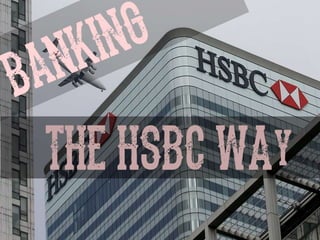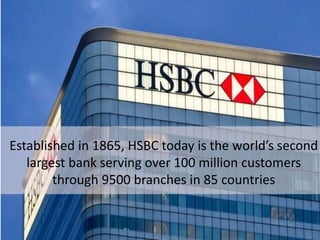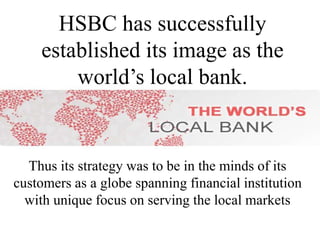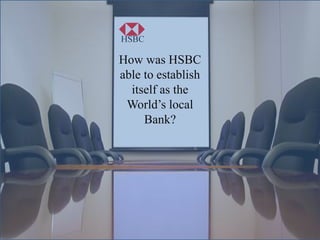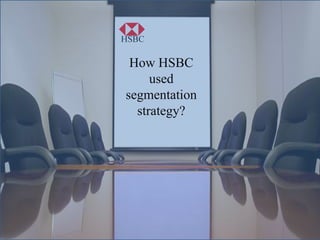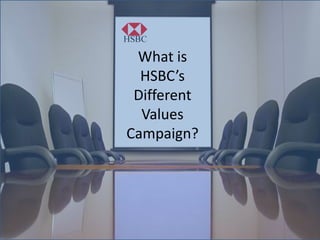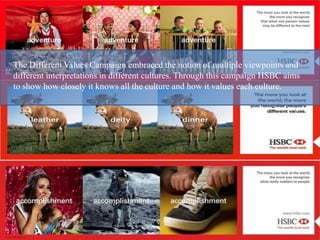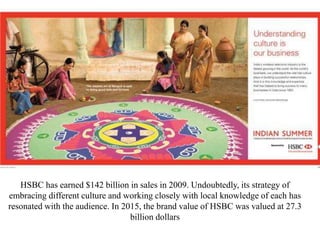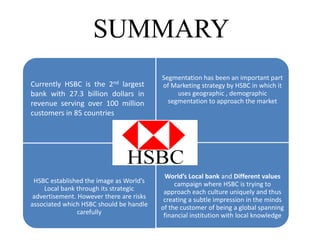HSBC Marketing
- 2. Established in 1865, HSBC today is the world’s second largest bank serving over 100 million customers through 9500 branches in 85 countries
- 4. HSBC has successfully established its image as the world’s local bank. Thus its strategy was to be in the minds of its customers as a globe spanning financial institution with unique focus on serving the local markets
- 5. How was HSBC able to establish itself as the World’s local Bank?
- 6. HSBC was able to establish the image through range of advertisements focused on different cultural values
- 7. The advertisement shows how Germans associate cars with pride and any minor accident is taken very seriously whereas just across the border in France they take a carefree approach
- 8. The advertisement shows how in English culture its a slur on the hosts’ if you do not clear your plate whereas the Chinese feel it is questioning their generosity if you do so
- 9. The advertisement shows how Germans associate cars with pride and any minor accident is taken very seriously whereas just across the border in France they take a carefree approach The advertisement depicts how gestures depict different things in different culture
- 11. To establish its local presence in New York, HSBC launched the ‘ New York’s most knowledgeable cabbie’ contest. 6 Finalists were chosen and the winner got to drive HSBC- branded bank cab full time. Any customer showing HSBC bank card, checkbook or bank statement were able to get a free ride in the cab. Thus it was another attempt to establish itself as the ‘World’s Local Bank’
- 13. • HSBC used this concept to segment different markets based on location and cultural values. Then it approached each segment with which appealed to the people. Geographic/Demographic • HSBC strategized to target various age groups. In this attempt it offered ‘smart cards’ and no-frills credit cards to underserved student segment. Generation/Age • HSBC also targeted its high value customers with special “ Premium Centers” bank branches Income SEGMENTATION PARAMETERS
- 15. The Different Values Campaign embraced the notion of multiple viewpoints and different interpretations in different cultures. Through this campaign HSBC aims to show how closely it knows all the culture and how it values each culture.
- 16. Is there any risk in the Marketing Strategy of HSBC?
- 17. HSBC has benefitted through the campaign of embracing different culture . However there are subtle risks associated that HSBC should take care of: 1. Since HSBC is specifically catering to different culture and not engaged in undifferentiated and mass Marketing a large workforce is needed for such a campaign to have the knowledge of individual ethnicities . 2. This would require huge financial budget to conduct financial activities in a global market that can reduce profitability. 3. Further HSBC is working with a lot of culture. Thus, it needs to be careful to remain neutral with all and not hurt the sentiments of one segment to appease the other. RISKS
- 19. HSBC has earned $142 billion in sales in 2009. Undoubtedly, its strategy of embracing different culture and working closely with local knowledge of each has resonated with the audience. In 2015, the brand value of HSBC was valued at 27.3 billion dollars
- 20. Segmentation has been an important part of Marketing strategy by HSBC in which it uses geographic , demographic segmentation to approach the market HSBC established the image as World’s Local bank through its strategic advertisement. However there are risks associated which HSBC should be handle carefully World’s Local bank and Different values campaign where HSBC is trying to approach each culture uniquely and thus creating a subtle impression in the minds of the customer of being a global spanning financial institution with local knowledge Currently HSBC is the 2nd largest bank with 27.3 billion dollars in revenue serving over 100 million customers in 85 countries SUMMARY
- 22. Created By Ananta Chhajer, Jadavpur University during a Marketing Internship with Prof. Sameer Mathur, IIM Lucknow DISCLAIMER

